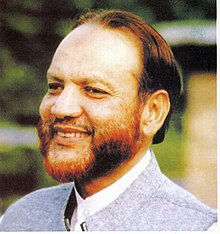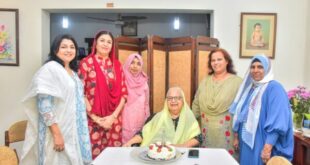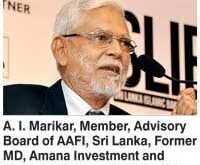 Brother Khurram Murad was born in Bhopal, India, in 1932, and he migrated to
Brother Khurram Murad was born in Bhopal, India, in 1932, and he migrated to
Pakistan in 1948.
Khurram Murad studied civil engineering at the University of Karachi (B.E. 1952), securing 1st place in the University, and went on to study in the University of Minnesota (USA) (MSc. 1958).
He worked as a leading consulting engineer in Karachi, Dhaka, Tehran and Riyadh.Associated Consulting Engineers Ltd., with which he worked as a chief engineer and resident director, was responsible for the initial design and electrification of the extension of the Masjid al-Haram, Makkah and Khurram Murad played an importantrole in the formulation and implementation of the plans for extension of the Haram.
Khurram Murad’s whole life, from early boyhood to his last moment, was dedicated to the service of the Islamic movement. He was initiated in the Jamaat-e-Islami, Bhopal, as a student and joined Islami amiat-e-Talaba, Pakistan, immediately after his arrival in Karachi in November 1948. In the Jamiat he served as the President of the Karachi unit (1949-50) and as its Nazim-e-A’la (All Pakistan President) during 1951- 1952.
After the conclusion of his student career, he joined the Jamaat- e-Islami, Pakistan and served as its Amir at the important cities of Dhaka (1963-71), and Lahore (1987-89), as a member of Central Shura working Committee) and ’Amila (Executive Committee) (1963-1996) and as its Naib Amir (Vice-President) (1987-1996).
In 1992, he was appointed editor of the monthly Tarjumanal Qur’an, Lahore, the journal founded by Mawlana Abul A’la Mawdudi in 1932 and which has been the chief pace- setter for the Islamic ovement in the Indo-Pak subcontinent.
He was a Trustee and a former Director General of the Islamic Foundation Leicester. He was also the editor of the quarterly Muslim World Book Review, Leicester, UK.
Khurram Murad occupies a place of distinction in the intellectual firmament of contemporary Islam. A thinker, an orator and a prolific writer, he has been one of the architects of current Islamic resurgence. While his da’wah activities began in Pakistan, he has been involved in the promotion of the Islamic movement in Asia, Europe, Africa and the Americas. As a teacher and a da’iyah his speeches and thoughtful orations have inspired thousands of young men and women all over the world.
As chief of the training departments of the Jamiat, the Jamaat and as an active resource-person in training programmes in the UK and America, he played a key role in the character-building of the youth in the Islamic Movement. An author of over thirty works in Urdu and English, his thoughts have influenced two generations of Muslims all the world over.
His books include:
a) Inter-Personal Relations in an Islamic Movement (Urdu) :
b) Way to the Qur’an :
c) Islamic Movement in the West: Reflections on Some Issues : d) Lam’at-e-Zandan (Urdu) :
e) Shari’ah: The Way to God :
f) Shari’ah: The Way to Justice :
g) Key to al-Baqarah :
h) Quranic Treasures :
i) Gifts from Muhammad :
j) Who is Muhammad.
As a translator and interpreter of Mawlana Mawidud, Khurram Murad has made his mark. “Let us be Muslims,”
“Islamic Movement: Dynamics of Values, Power and Change,”
“The Islamic Way of Life,”(with Khurshid Ahmad) are his major contributions.
He also edited Mawlana Abul Hasan Ali Nadwi’s pioneering work, “Muslims in the West: Message and the Mission.”
Khurram also wrote over half a dozen books for children, edited and directed a video on “The Life of the Prophet Muhammad,” and contributed dozens of scholarly articles to different journals and magazines. Over four hundred audio and video cassettes of Khurram Murad are in circulation in Pakistan and different parts of the Muslim World.
Khurram Murad was involved in Islamic da’wah and inter-faith dialogue in the West for the last twenty years. In this connection, he addressed dozens of conferences and seminars. His contributions in initiating and promoting strategic thinking on da’wah issues in Muslim countries as well as in countries where Muslims are in a minority have been immense.
He died in Leicester on 19th December, 1996 i.e. 9th Sha’ban 1417 H. He left a widow, four sons and two daughters.
Post Disclaimer | Support Us
Support Us
The sailanmuslim.com web site entirely supported by individual donors and well wishers. If you regularly visit this site and wish to show your appreciation, or if you wish to see further development of sailanmuslim.com, please donate us
IMPORTANT : All content hosted on sailanmuslim.com is solely for non-commercial purposes and with the permission of original copyright holders. Any other use of the hosted content, such as for financial gain, requires express approval from the copyright owners.
 Sri lanka Muslims Web Portal Sri Lanka Muslims News Center
Sri lanka Muslims Web Portal Sri Lanka Muslims News Center
 Donate
Donate


